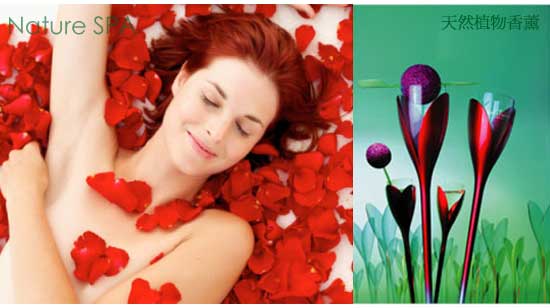


ABOUT AROMATHERAPY
What is Aromatherapy?
Aromatherapy means "treatment using scents". It is a holistic treatment of caring for the body with pleasant smelling botanical oils such as rose, lemon, lavender and peppermint. The essential oils are added to the bath or massaged into the skin, inhaled directly or diffused to scent an entire room. Aromatherapy is used for the relief of pain, care for the skin, alleviate tension and fatigue and invigorate the entire body. Essential oils can affect the mood, alleviate fatigue, reduce anxiety and promote relaxation. When inhaled, they work on the brain and nervous system through stimulation of the olfactory nerves.
The essential oils are aromatic essences extracted from plants, flowers, trees, fruits, bark, grasses and seeds with distinctive therapeutic, psychological, and physiological properties, which improve and prevent illness. There are about 150 essential oils. Most of these oils have antiseptic properties; some are antiviral, anti-inflammatory, pain-relieving, antidepressant and expectorant. Other properties of the essential oils which are taken advantage of in aromatherapy are their stimulation, relaxation, digestion improvement, and diuretic properties. To get the maximum benefit from essential oils, it should be made from natural, pure raw materials. Synthetically made oils do not work.
Aromatherapy is one of the fastest growing fields in alternative medicine. It is widely used at home, clinics and hospitals for a variety of applications such as pain relief for women in labor pain, relieving pain caused by the side effects of the chemotherapy undergone by the cancer patients, and rehabilitation of cardiac patients.
Aromatherapy is already slowly getting into the mainstream. In Japan, engineers are incorporating aroma systems into new buildings. In one such application, the scent of lavender and rosemary is pumped into the customer area to calm down the waiting customers, while the perfumes from lemon and eucalyptus are used in the bank teller counters to keep the staff alert.
How Does Aromatherapy Work?
Essential oils stimulates the powerful sense of smell. It is known that odors we smell have a significant impact on how we feel. In dealing with patients who have lost the sense of smell, doctors have found that a life without fragrance can lead to high incidence of psychiatric problems such as anxiety and depression. We have the capability to distinguish 10,000 different smells. It is believed that smells enter through cilia (the fine hairs lining the nose) to the limbic system, the part of the brain that controls our moods, emotions, memory and learning.
Studies with brain wave frequency has shown that smelling lavender increases alpha waves in the back of the head, which are associated with relaxation. Fragrance of Jasmine increases beta waves in the front of the head, which are associated with a more alert state.
Scientific studies have also shown that essential oils contain chemical components that can exert specific effects on the mind and body. Their chemistry is complex, but generally includes alcohols, esters, ketones, aldehydes, and terpenes. The effect of these chemical components are summarized in the accompanying table.
Which Problems can Aromatherapy Help?
Aromatherapy is particularly effective for stress, anxiety, and psychosomatic induced problems, muscular and rheumatic pains, digestive disorders and women's problems, such as PMS, menopausal complaints and postnatal depression. Here is a summary of the results from clinical studies:
Aromatherapy for Behavior
Considerable evidence exists that fragrant compounds and aromatherapy have a profound effect on our mind and behavior. Animal studies have found that hyperexcited mice (as a result of consuming a large quantity of caffeine) was calmed by the aroma of lavender, sandalwood, and other oils sprayed into their cages. The same mice were found to become very irritable when exposed to the aroma of orange terpines, thymol, and some other substances. These oils were all detected in their bloodstream after about an hour.
Aromatherapy for Sleep
In a study reported in the British Medical Journal Lancet, elderly patients slept "like babies" when a lavender aroma was wafted into their bedrooms at night. These patients had complained of difficulty falling asleep and had to take sleeping pills to get sleep prior to the aromatherapy.
Aromatherapy for Postpartum discomfort
In a double blind study, 635 women applied lavender oil to their perineal area (part of the body between the vagina and the rectum) after child birth. The women reported a distinct improvement between the third and fifth day. (The discomfort is the worst during this time for patients in the control group.)
Aromatherapy for Colds
It has been well established that chicken soup is good for cold (both historically and scientifically). Studies were conducted to find out whether the effect was due to the action of the hot steam on the lining of the nostrils or whether the aroma of the chicken soup has anything to do with it. The results indicated that chicken soup was more effective than the steam indicating the effectiveness of the aroma.
Aromatherapy for Stress
In a study conducted at the Memorial Sloan-Kettering Hospital in New York, patients undergoing magnetic resonance imaging (MRI) reported 63 percent less claustrophobic after getting exposed to the aroma of vanilla. There was no change in their heart rate. Obviously, the aroma reduced their anxiety probably by the pleasant memories evoked by the vanilla aroma or by some other physiological response.
Date:2009-8-7 【return】